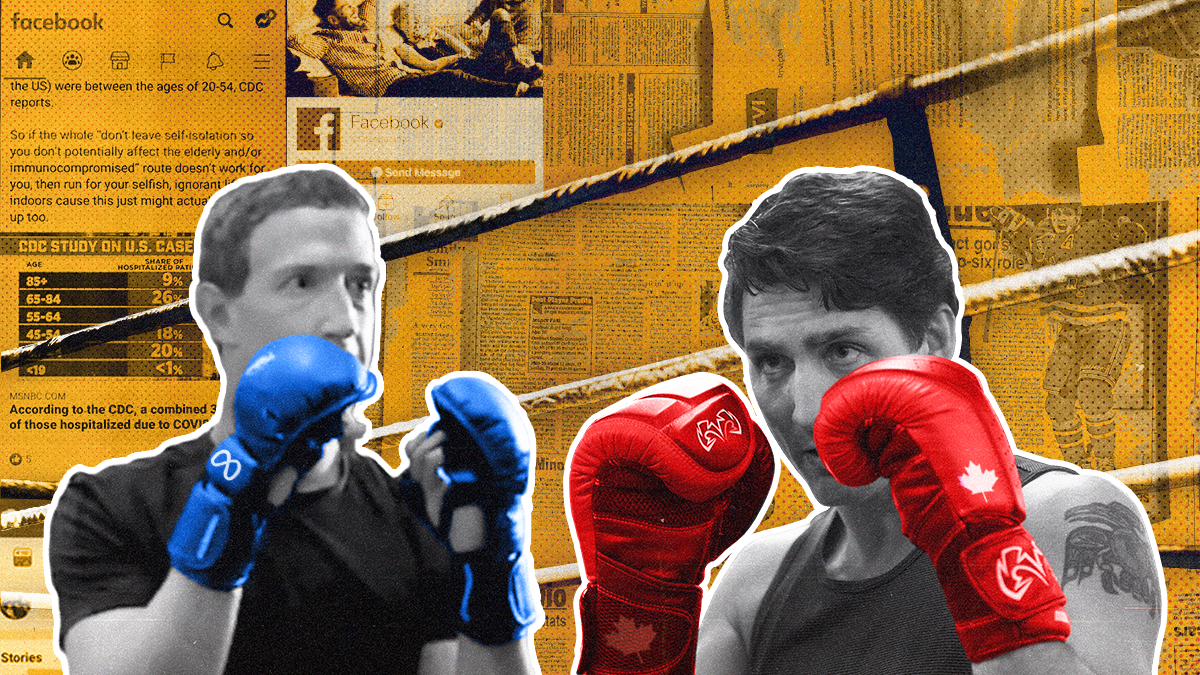On June 22, the day Canadian PM Justin Trudeau’s government passed a law forcing revenue-sharing on tech giants, Meta announced it was getting ready to block Canada’s news outlets from Facebook and Instagram.
This was merely the latest bad news for a media industry in crisis.
A week earlier, Bell Media announced it was cutting 1,300 jobs in radio and TV newsrooms across Canada. Bell runs CTV, which has the top-rated national news broadcast, but it says it is losing $40 million a year on broadcasting. It closed its bureaus in London and Los Angeles, got rid of many of its best-known journalists, and has applied to the regulator, seeking to cut local news broadcasts.
These cuts look familiar to colleagues in print newsrooms. Postmedia News, Canada’s biggest newspaper chain, laid off 11% of staff at its papers in January, further slashing newsroom budgets that long ago looked cut to the bone. The company is taking extraordinary efforts to cut costs, closing its newsrooms in Vancouver, asking suppliers to reduce prices, and even shutting down the opinion section of its Montreal paper over the summer to save money.
This week, news broke that the Toronto Star and Postmedia may merge days after Postmedia’s executive chair left the company – signs that the chain is not on a sustainable track.
Trudeau’s revenue-sharing law was intended to be the government’s answer to the collapse of journalistic models, but instead it looks as though it may make things worse.
In Canada, as in the United States and the rest of the world, traditional news organizations have lost advertising revenue to the tech giants, undercutting the business model that supports journalism. From 2008-2020, revenue for Canadian TV, radio, newspapers, and magazines fell by nearly CA$6 billion, leading to the loss of thousands of jobs and the closure of hundreds of outlets.
To try to preserve a functioning news ecosystem in Canada, Trudeau’s government in 2019 brought in a payroll tax credit that has funded jobs at many outlets, but it has not stopped the decline. This spring, his government passed Bill C-18, modeled on a similar law in Australia, aimed at forcing Google and Meta to share about CA$330 million a year with news outlets whose stories they link to.
Meta said “no,” and it has begun testing news-blocking measures on the platform, promising to shut off its users from news content rather than pay. After the bill passed, it canceled at least one of its royalty-sharing deals with a Quebec media consortium.
Google sounded more conciliatory at first, but on Thursday it, too, rejected the scheme and promised to stop linking to Canadian news sites.
The platforms may want to send a message to legislators in the United Kingdom, Brazil, South Africa, and California, who are all considering similar measures, while also warning the US Senate, where there is bipartisan support for a similar measure.
The platforms’ intransigence in Canada has some critics of the law declaring it a failure already. University of Ottawa professor Michael Geist, who opposed the law during the legislative process, warned that it “could cause enormous harm to the media sector and may lead to a serious case of buyer’s remorse.”
It may turn out that publishers need the platforms more than the platforms need them. On the other hand, they could still back down, which is, more or less, what happened in Australia. Meta and Google are now paying Australian news outlets about AUS$240 million a year.
Taylor Owen, a media expert and McGill University professor, thinks Meta may back down and pay up. “I can’t imagine a world in which Facebook blocks news in eight to 10 jurisdictions, including in California, which has a market the size of Canada, in which the company is based,” he said on a recent podcast. “What does that look like, realistically? You create a list of thousands of news organizations and they are just blanket blocked from being seen on what is ostensibly an open platform? Maybe that’s worth it to them. I have my doubts.”
Meta founder Mark Zuckerberg used to talk about the ways that Facebook could help strengthen journalism, but recently the company has been reducing the role of news, which leads to costly partnerships, and is boosting personal content instead.
“It’s been downshifted in the last year or so, and they probably have a very small percentage of their traffic at risk here, so it may be a good place to take a stand,” says Edward Greenspon, president & CEO of the Public Policy Forum, who wrote an influential report on the crisis facing the Canadian media. Being news-free in Canada and seizing the momentum in other jurisdictions, he says, “might be a reasonable tradeoff for them.”
Diana Bossio, an associate professor of media at Australia’s Swinburne University of Technology, thinks Meta may be serious about dropping news from its platform. “Meta is in a different financial situation than it was when Australia was discussing the [revenue-sharing code there]; there are currently about $240 million worth of reasons the platform will not want to set an international precedent for payment for news!”
Google, too, won’t want to open the floodgates to claims from dying publishers around the world.
“They settled deals quickly in Australia but may act differently in Canada to prevent an onslaught of claims,” says Bossio.
The new law won’t take effect for six months, so there is still time for the government to try to get the tech titans onside. But it looks like Trudeau may have misjudged the situation and is about to send a signal to the world that the tech giants can’t be made to pay for news.
